In an interview with AyiboPost, the institution’s director, Joses Jean Baptiste, believes that adopting « such a measure will have no effect on the market since the majority of users already have both cards [Digicel and Natcom] »
In 2020, the former director of the National Telecommunications Council (CONATEL), Jean Marie Guillaume, announced to AyiboPost that the state would spend several million dollars to allow mobile phone customers in Haiti to change operators while keeping their numbers, starting in October 2021.
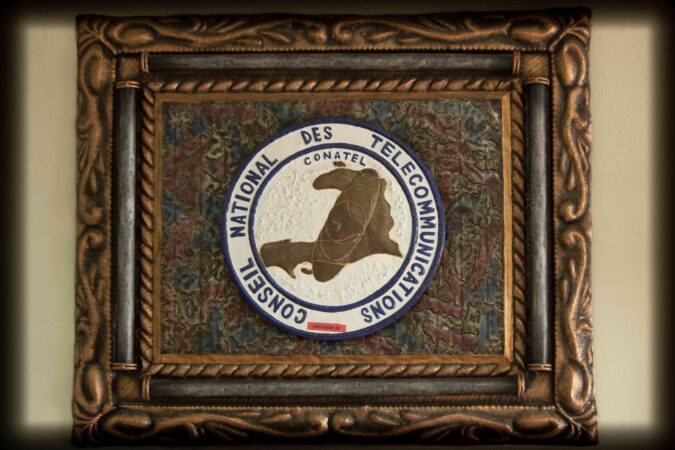
A painting made of an ornate frame showing the CONATEL emblem stands at the entrance to the office of the current Director-General, February 23, 2024. | © Jean Feguens Regala/AyiboPost
Contacted at the time by AyiboPost, Digicel – which holds 70% of the market – refused to comment on the matter. But Natcom had enthusiastically welcomed the project, according to its spokesman.
Since then, CONATEL has changed its director.
And the possibility for sometimes frustrated customers who want to change companies without changing numbers is not one of the immediate plans of the institution headed by Joses Jean Baptiste.
For the new director, « adopting such a measure will have no effect on the market since the majority of users already have both cards in their possession, » Digicel and Natcom.
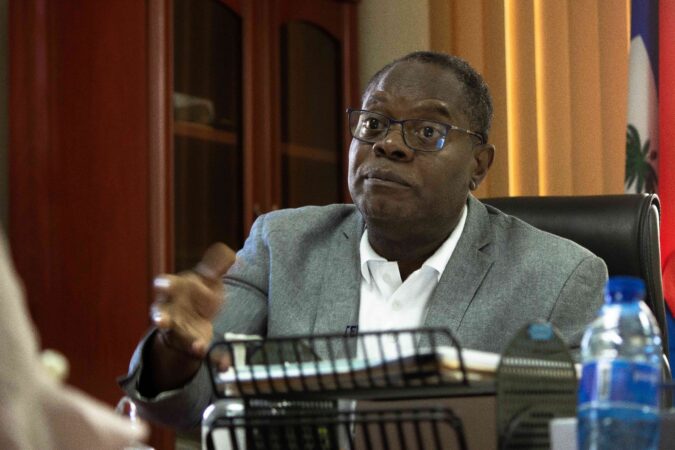
The current director of CONATEL gave an exclusive interview to AyiboPost on February 23, 2024, in his office, at the institution’s premises, in Port-au-Prince.
According to Joses Jean Baptiste, before thinking about number portability, you have to « first create competition. »
Interviewed by AyiboPost on February 23, 2024, the CONATEL director also addressed the disorderly sale of SIM cards as well as his achievements and projects, after one year as head of the institution.
For the sake of clarity and brevity, the interview has been edited.
What is the status of the phone number portability project?
It must be said that number portability is a regulatory measure taken to strengthen competition.
An economic market, like the telecommunications market, has its characteristics. When you have a single operator, you have a monopoly, and a monopoly in an economic market is not recommended.
Therefore, when you have two operators, you have a duopoly, and users will have a choice. Right now, we don’t have any competition. You have competition in a market when there are at least three operators with roughly 30 to 33% of the market.
This will ensure that operators don’t want their numbers to fall and their competitors’ numbers to rise. Portability is there to keep the competition going, but it doesn’t create it.
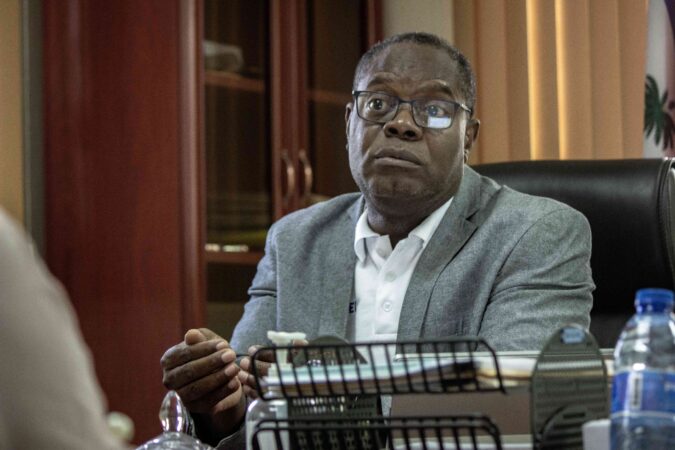
The current director of CONATEL granted an exclusive interview to AyiboPost on February 23, 2024, in his office, at the institution’s premises in Port-au-Prince.
When you have a duopoly, users know the weaknesses of each of the two competitors. They have a SIM card for each of them that fits their needs.
In fact, you are already in portability since the majority of users already have both SIM cards.
Portability is necessary when the market becomes competitive, when you have more than two carriers. We have to create the competition and if the competition does not give the expected results, then we can implement the measure of portability. But if you use it well before, you’re putting the cart before the horse.
CONATEL’s planned completion date for this project was October 2021. The project was active in 2019. Why this sudden turnaround on the part of the institution?
Because today, adopting such a measure will have no effect on the market since the majority of users already have both cards in their possession. First of all, you have to create competition, not have a dominant operator.
Read also: À partir d’octobre 2021, vous pourrez changer de réseau en gardant votre numéro, promet le CONATEL
What about the consumer who is dissatisfied with a service and wants to keep his number by changing companies?
The market has to be competitive. If it isn’t, you can’t use that tool.
What projects are being carried out at CONATEL?
One of the ongoing projects is the establishment of a platform for the identification and authentication of SIM card buyers, which represents a double challenge both in terms of security and for the digital economy.
With the advent of the digital economy, the regularization of users is becoming a necessity.
This is why the government has been working on this issue and has proposed solutions, including the establishment of a platform that will be connected to the National Identification Office’s databases. When a user purchases a SIM card by presenting identification, they will be able to use it to register that SIM card.
Read also: DCPJ investigations slowed by illegal sale of Digicel and Natcom SIMs
SIM card users who have not been registered before can also use the platform to register.
One of the ongoing projects is the establishment of a platform for the identification and authentication of SIM card buyers.
There is also the development of a legal and regulatory framework for the use of social networks in Haiti. Their use is growing in the country, but there are no defined regulations in this regard yet.
CONATEL is looking into this issue and is setting up a unit to study the situation and propose regulatory measures to the government. The first recommendation of this unit is the creation of a structure responsible for receiving complaints. At the legal level alone, it is necessary to compile all the incidents and complaints made in order to be able to deal with them legally.
We initiated the project to migrate from analog television in Haiti to digital television. The network of television channels in Haiti uses a very old system dating back to 1930, namely analog television.
This migration will allow each TV station to broadcast a single program, or to group multiple stations on a single channel, thus offering multiple programs on a single channel. If we can compress these stations, we will no longer need to have all of these channels.
Read also: Des cartes SIM vendues sans contrôle dans les rues utilisées par des criminels
There is also the implementation of the electronic signature, which will have legal value. The good news is that this week, CONATEL received its international code issued by the International Telecommunication Union (ITU). This code will be identifiable for Haiti. The electronic signature is of particular importance. It will no longer be mandatory to go to a notary or other office to sign a document. At the moment, the project is awaiting an implementing text from the government. Once published, the launch of calls for tenders will follow to find companies that will be authorized to provide the service.
The good news is that this week, CONATEL received its international code issued by the International Telecommunication Union (ITU). This code will be identifiable for Haiti.
Cybersecurity has also been revived. If we want to integrate into the digital world, it is essential to protect our networks, our banks, etc. A dedicated CONATEL unit works in collaboration with the Haitian Institute of Statistics and Informatics (IHSI) to maintain a network protection system against intrusions, identity theft, etc.
You mentioned the establishment of a platform for the regularization of SIM cards in Haiti. Could you provide us with a detailed overview of the progress of this project?
We have already prepared the tender document, which is 95% complete.
Then we have the terms. Since this is a platform that will be implemented, there will be a physical commission to enable interconnectivity between the ONI database and telephone operators.
Why are mobile phone companies not part of the identification process?
They will be part of it. In fact, it is the state that has set up this platform and will give a license to a company to operate. This is why we have created the specifications that will define the technical and financial conditions for the interconnection with ONI and these two operators.
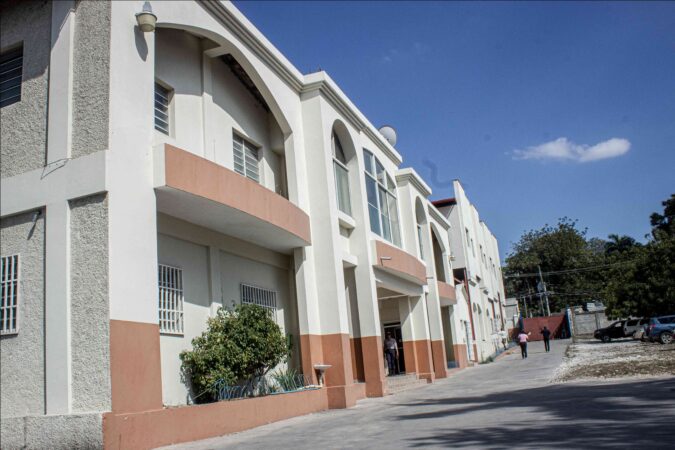
A view of the building housing CONATEL in Port-au-Prince.
When will the project be operational in Haiti?
This project will be operational this year. Because in this phase, our tender documents are already prepared. Next week, we will adopt and study the terms of reference. After that, the administrative processes will be carried out with the Haitian State. At the moment, our work is at 80% completion.
Considering the quantity of unidentified SIM cards already in circulation, how will CONATEL act to regularize them?
This platform will make it easier to check in without having to physically go to the companies. We’ll bring the service to the customer.
And this convenience gives companies much more means to impose a deadline for users who are not yet identified. They will also have the ability to block those who have not registered. This initiative will close the floodgates on unregistered SIM cards.
There will always be a process to identify the person who procure a pack of cards for sale. But, the focus and what we are interested in will be the identification of the end user.
With one click, they will be able to identify themselves, otherwise the card will be disabled.
Does CONATEL have any idea of the number of identified and unidentified SIM cards on the national territory at the moment?
Yes, we are aware of the quantity based our data, but we can’t share this information. However, we are aware of the magnitude of the situation.
Natcom has announced that from February 8, 2024, the electronic SIM (e-sim) will be available. This is a fairly new initiative for Haiti. Does CONATEL, as a regulatory entity, have some control over the initiative?
In fact, the technology is booming, and the innovation of embedded digital SIMs is the trend.
These initiatives pose challenges. So, CONATEL observes them and determines the appropriate regulation needed in due course.
Cover image edited by AyiboPost showing the current director of CONATEL. | © Photo: © Jean Feguens Regala/AyiboPost
Keep in touch with AyiboPost via:
► Our channel Telegram: click here
► Our Channel WhatsApp: click here
► Our Community WhatsApp: click here

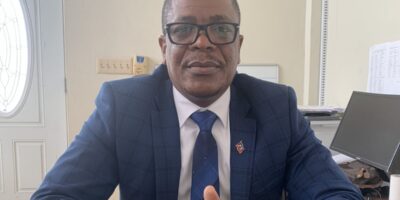




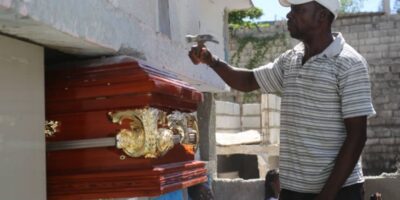
Comments